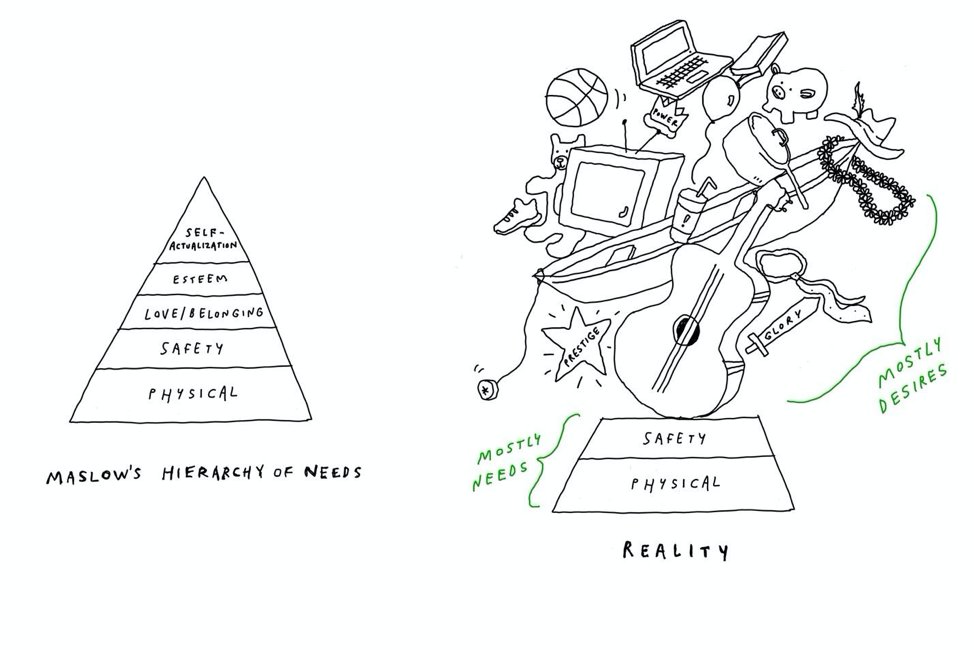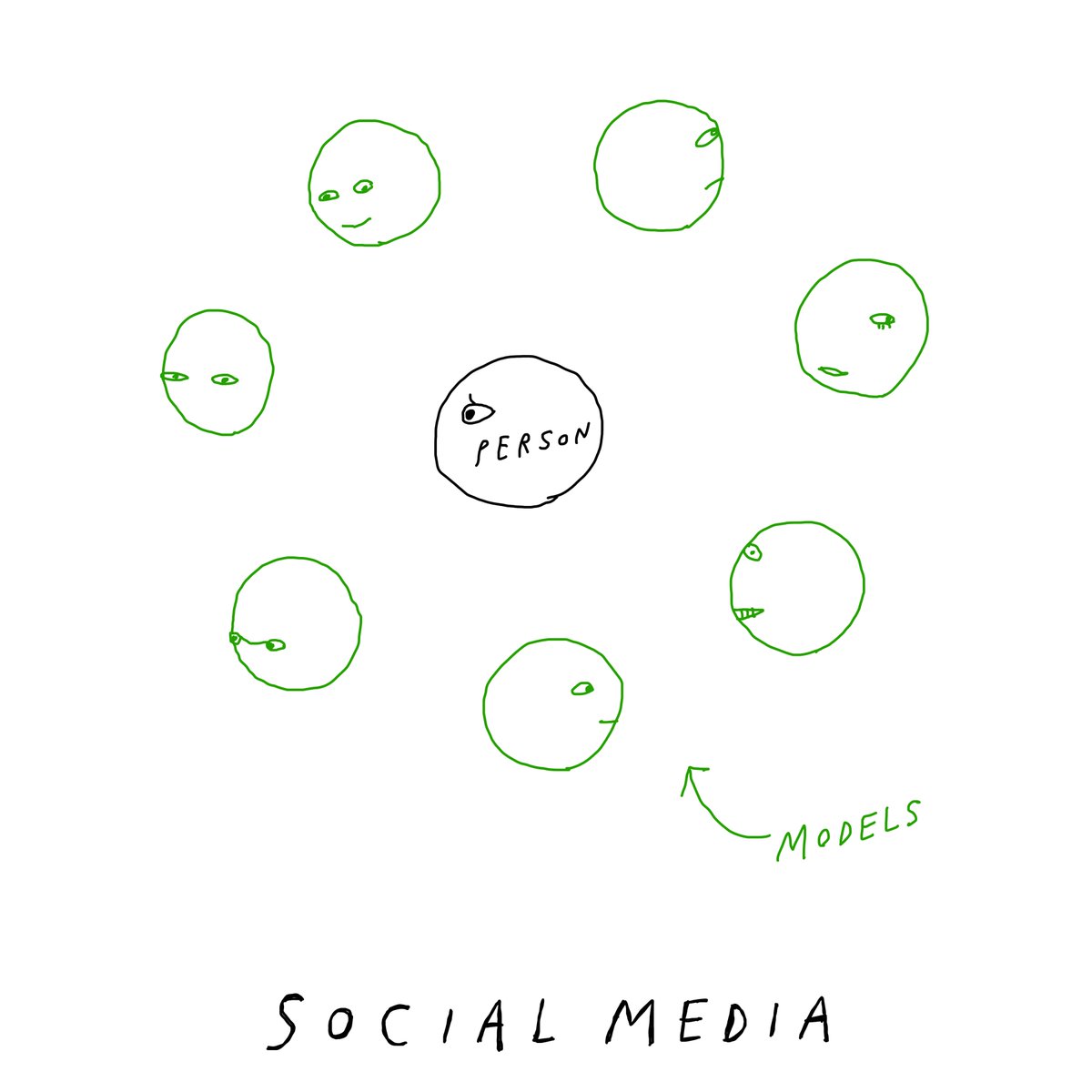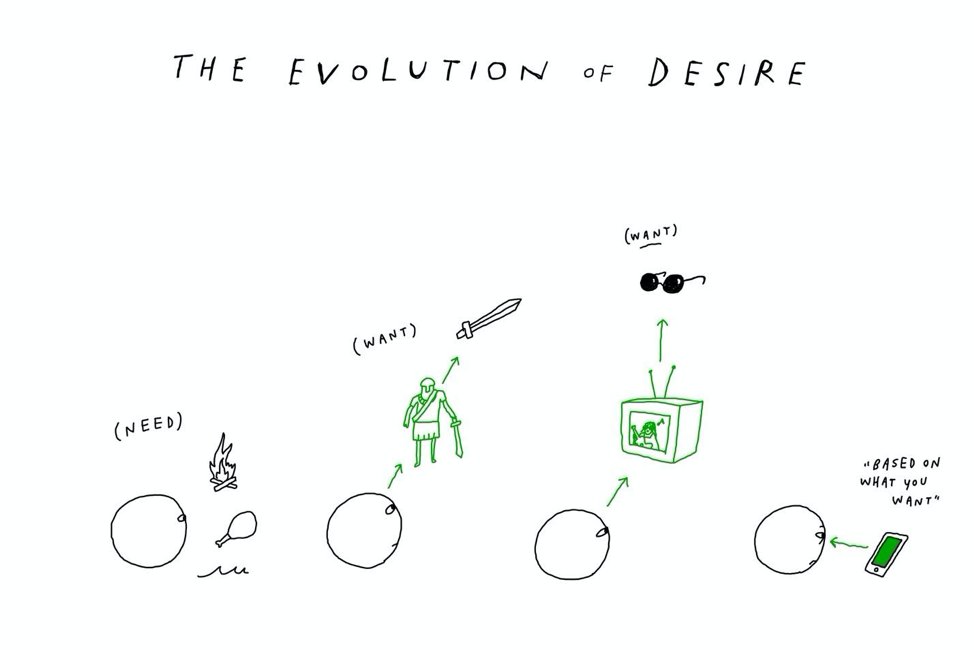
Mimetic desire is wanting "according to the desire of another"—we want what other people want *because* they want it. But we almost never realize we're doing this. We live under the illusion of the Romantic Lie. The path to the objects we desire is never straight, but curved. 

In reality, most of what we commonly think of as "needs" are really "desires." And desires are NOT in any real hierarchy. We can begin to desire almost anything at any time—provided the right model comes along. This is why we live in such a "liquid" modernity. 

Our models of desire may be "external mediators" of desire—that is, people outside of our immediate world, with whom no serious rivalry is ever possible. There is a barrier between us and them, whether death or time or space or simply social status. Let's call it Celebristan. 

Other models are "internal mediators" of desire—that is, they are inside our world. We can compete directly with them, collide with them. The possibility of rivalry is high— and nearly inevitable—given enough time. Let's call it Freshmanistan. 

On social media, each of us is surrounded by these models. We are all, in a sense, in Freshmanistan. The whole world has become a freshman class, everyone wondering who to imitate while simultaneously posturing as if they're imitating no one. 

The desire that each of us has is not just for some particular "thing." Ultimately, it's to BE a certain kind of person. All desire is metaphysical desire—a desire for being. The models we choose is tied up with who we want to be. The models we choose are merely conduits. 

In Freshmanistan (the world of internal mediators of desire—where we can compete with others), mimetic desire leads people into escalating mimetic and REFLEXIVE rivalries. They often result in ridiculous attempts to pursue objects that we care about only because our model does. 

The evolution of desire has led people to become obsessed with increasingly abstract and trivial things. The wealthier people are, the more you can count on them having strange hobbies and interests. It makes perfect sense, mimetically. 

Mimetic desire in Freshmanistan leads us into rivalries, which leads to collisions and conflict with others who have started competing with us for the same things: status or power or objects (Objects like watches are only talismans, ways of keeping score. Magical hunks of metal.) 

When this goes far enough, people forget what they were competing for in the first place.
Mimetic rivalry is contagious. When it breaks out in a community, it turns into a war of all-against-all. People begin to resemble one another. Objects/policies fade into the background.
Mimetic rivalry is contagious. When it breaks out in a community, it turns into a war of all-against-all. People begin to resemble one another. Objects/policies fade into the background.

Eventually, the crisis is resolved when someone—chosen more or less randomly b/c they "stand out" for some trivial reason—is singled out and draws the attention of all as the cause of the problem. This unites the previously chaotic mob around a scapegoat. This brings order. 

It only takes one person to throw the first stone, hurl the first accusation, strike the first blow, tweet the first tweet. The first is the hardest because it lacks a model. The 2nd is exponentially easier. And the third, well... 

The elimination or expelling of a scapegoat from the group provides catharsis and even temporary peace. But it is short-lived. The flywheel starts spinning again as soon as a mimetic rivalry breaks out again. This time, the cycle happens even faster. 

For more on how this process unfolds—and what each of us can do to lead far more fulfilling lives—sign-up for the Anti-Mimetic Newsletter.
Start with Mimetic Desire 101: a more complete version of this thread.
Strap in. 🚀 We're just getting started.
read.lukeburgis.com/p/mimetic-desi…
Start with Mimetic Desire 101: a more complete version of this thread.
Strap in. 🚀 We're just getting started.
read.lukeburgis.com/p/mimetic-desi…
• • •
Missing some Tweet in this thread? You can try to
force a refresh




